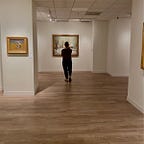A Time to Mourn
This month, my plan was to write about two new books, both by white men with the first name John. I wouldn’t usually choose titles with such homogeneity.
When I select books, it’s because I think they’ll add to who I am by exposing me to who I am not, and these were no exception to that practice. I like to read and write about experiences different from my own. This is why I’ve written about novels concerning gay South Asian women afraid to come out to their families, and men negotiating the inherent “us and them” of military life in Iraq, and the ingenuity of impoverished Americans facing a fictional second American civil war.
We decide how much to stretch our minds by what we ask them to do. Empathizing with the many book-bound friends a reader makes in their lifetime does this. The books I’d chosen for this month’s column seemed to achieve this — at first. But then, I was involuntarily schooled in another method of growth.
I awoke thirty-four days ago to a voicemail from my mother-in-law: One sobbing sentence, telling David, my husband, that his only brother was “gone.” He’d died in his sleep. Our life slowed with the shock.
I drove (I usually never do) and David made calls to his family, because someone had to tell them the news.
We got to his mother’s house, and we cried.
I washed her hair, and we cried.
We made dinner, and cried.
The three of us slept in her California king bed, and woke up often to cry even more. The fires were still raging over Northern California, so we were sleeping with the windows closed, all of our eyes irritated from the soot in the air that we could not escape.
Grief is exhausting. It is weight hung from places that normally are light — the mouth, the cheeks. After three days of crying, my husband woke with blue rings around his eyes, like healing bruises.
Inside this mental space, writing a review, or even reading a book, began to feel ludicrous. As ludicrous as the arguments that were happening among family members about what was to be done with the body, about what kind of service would be held.
The “us” of family is solvent in grief. The idea that hard things could connect people with long-held grievances bared itself as the myth it is.
This year has laid divisions bare on a much larger scale — through the divorces, the broken friendships, the Facebook arguments incited by President Trump’s election. It is just as hard — no, it’s harder — to learn to love the person who’s hurt you on a person level, than it is to deal with the outbreak of affronts wrought by a narrowly elected oligarch.
We three, though — David, his mother, and I — despite the strife and bickering, the anger and dead communication outside our little circle, have grown closer. These weeks have been some of our hardest, ever, but through a thousand tiny acts of love and care — dish washing, foot rubbing, food making, dog walking, bill paying, toilet cleaning, hand holding, back massaging — we’ve grown closer.
These two books by men named John are worth your time. John Hodgman’s Vacationland is a hilarious, pointed examination of white male privilege (and doubt, and inanity, and safety). Hodgman hits broad thematic chords by striking a series of very personal notes. He wields words, aiming for maximal reader mirth. For example, calling parenthood “full-feces immersion therapy.”
John Freeman’s newest anthology, Tales of Two Americas, is much more serious in tone. The writers included here write on a plurality of subjects, some to great effect. Julia Alvarez uses air travel as a lens through which to study America’s (and the airport’s) class system. Claire Vaye Watkins addresses a series of mini-memoir-essays to her sibling, “you.” This intimate acknowledgement––so close a relationship it doesn’t require a name––sets up the “you” as a part of the “me.” Sibling intimacy brought on by insecurity in childhood — due to lack of money, unpredictable and unreliable adults, alcoholism — is very pure. This person has been there for all the ugliness and yet has also seen your rarest joys. There are many more writers and poets included here, but I trust the long list of names won’t further persuade you.
David had one sibling, and now his sibling is buried beside a towering eucalyptus tree. I cannot cure or heal his grief. I was moved to read my favorite Bible passage to him a few days ago, when the depths of his pain suddenly ran deeper, and neither of us knew what else to do. He laid back on our little couch, closed his eyes, and I rubbed his thigh while I read:
To every thing there is a season, and a time to every purpose under the heaven:
A time to be born, and a time to die; a time to plant, and a time to pluck up that which is planted;
A time to kill, and a time to heal; a time to break down, and a time to build up;
A time to weep, and a time to laugh; a time to mourn, and a time to dance…
Reading won’t cure us or change us. Only concerted thought and deliberate action can change anything, yet even these fail in times of great pain. But these books might bring perspectives into your life that you’ve never before been subjected to — on poverty, classroom behavior, homelessness, service, faith, even white male privilege. Only you can change you. But these might help. These might start a discussion that could eventually bridge a gap, and almost all of us have a bridge or two in need of repair.
